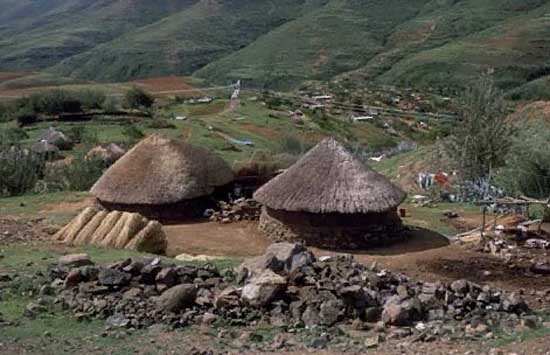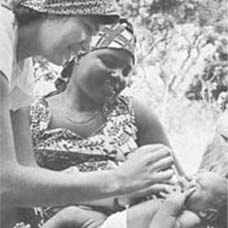
RPCV Evan Rice lived in Lesotho during the dismantling of apartheid and the rise of Nelson Mandela
Duke Law Students Heed the Call of
A f r i c a
In the summer of 1996, Evan B. Rice ‘98 and classmate David W. Archey ‘98 explored a haunting memorial in Rwanda. Both were in Africa on fellowships -- Rice as a Fulbright Scholar in Lesotho and Archey as a Lemkin Fellow in Rwanda.
They visited a small village church jammed with the decaying bodies of Tutsis. The Rwandan government had preserved the site of the massacre as a testament to the genocide in that country. Archey and Rice saw families strewn on the cement floors and in the wooden pews, frozen as they were when they died, surrounded by their personal belongings and sacks of rice. The victims had sought safety in the church only to be slaughtered.
"We walked around in awe. It was profoundly moving," says Rice. "The smell of death and decay stuck with me. Even 10 days later after showering and changing clothes, I could still recall this gut-wrenching smell."
The church memorializes the traumatic events of 1994, when an estimated one million Tutsis and moderate Hutus were massacred. The entire governmental apparatus, including the army and local administration, was used to carry out the genocide and to mobilize the active involvement of civilians.
Archey, who spent a year in Rwanda working on the Children's Rights Project for Save the Children, was struck by the contrast between the intense physical beauty of Rwanda -- a mountainous country with a mild climate -- and the "simmering social divisions and hatreds" he found among many of the people. "The bodies were cleaned out of the street," he says. But "there is an enormous amount of cynicism in the Rwandan culture now."
Local participation in the slaughter exceeded that in any other genocide, he says. "Evil was committed in Rwanda almost without parallel."
Archey's work included a study focused on the rights of children accused of crimes against humanity. There are over 1,600 minors incarcerated in Rwandan prisons waiting for trial, some as young as seven.
He was also the editor-in-chief of a children's rights monitoring manual to be used in the field. The manual, based on guidelines from the United Nations High Commission on Human Rights, addresses the rights of orphans in rural areas, inheritance rights of child refugees, the problem of children conscripted into the army, and other issues faced by children at risk.
Archey faced constant reminders of the genocide -- "when I planted a vegetable garden I dug up a human femur," he recalls. On an expedition with another American down the Nyabarongo River, Archey found a decapitated corpse.
But Archey says, "there were signs of life coming back to normal. The police returned to direct traffic in their white sleeves and whistles." The state-imposed curfew ended; bars and supermarkets reopened. The optimism, though, was tinged with doubts. "The rumor was that the traffic lights would never come back on."
Archey had previously spent three years in Africa; one as an undergraduate student in Cairo, and two as a Peace Corps volunteer in Chad, where he was twice evacuated to Cameroon because of political coups. "Africa assaults your senses," he says. "One feels very much alive there."
Rice has also been a Peace Corps volunteer in Africa. He spent two years in the tiny country of Lesotho teaching biology in a mountain village. Lesotho, with a population of 1.9 million covering an area slightly larger than Maryland, is entirely surrounded by South Africa. Rice, who lived there for the first time during the dismantling of apartheid and the rise of Nelson Mandela, had "a birds eye view of the huge political changes in South Africa."
The experience inspired Rice to consider law school. "It's easy to become jaded with the American legal system, " he says, "especially with media reports of outrageous tort settlements." By watching the birth of a new legal system, Rice realized that laws can make powerful changes in society. "You realize how much you take for granted about our system. It really hit home."
As a Fulbright Scholar, Rice returned to Lesotho to study the influences of Western legal systems on Basotho customary law. The Lesotho judiciary is a confluence of three different legal systems: British-influenced case law, a relic of the colonial period; Roman/Dutch civil law, which filters into Lesotho from its South African neighbor; and tribal law. Among other issues, Rice researched the legal impact of the yearly exodus of large numbers of Basotho men who leave the country to work in South African gold mines.
Rice lived in an old seminary house on a compound run by the Anglican Church -- the cottage was once the residence of Bishop Desmond Tutu. He did legal and cultural research in the libraries and archives of the University of Lesotho.
During Rice's year in Lesotho, King Moshoeshoe II died in a car accident. Rice compares the outpouring of public grief to that later displayed at the death of Princess Diana. As a result of his relationship to the U.S. embassy in Lesotho, Rice attended the state funeral for the king, a formal occasion "punctuated by cultural pageantry and traditional garb."
While the AIDS crisis has hit Lesotho and other African nations, few countries have been as ravaged by the disease as Malawi. Suzanne V. Alwan ‘98 spent the 1996-97 academic year as a Lemkin Fellow in the small, finger-shaped nation in southeastern Africa, where one million of the 11 million citizens are HIV-positive.
The Lemkin Fellowship is an interdisciplinary collaboration between the School of Law, the Duke Institute of Public Policy and Save the Children.
The spread of AIDS has been dramatic in Malawi, in part because the nation is a stop on the "Kinshasa Highway," a 2,000-plus mile trade route that loops down from Kenya, avoiding the rough terrain of central Africa, to the capital of the Democratic Republic of Congo (former Zaire). Truck drivers spread the disease among the people living on the route.
Malawian widows and orphans "suffer under the burden of Malawian's customary inheritance system," Alwan says. When a man dies, "his family descends upon his marital home the day after his death and removes anything of value. This includes all household and personal property and, frequently, the doors, roofs and windows of the house, leaving the widow and orphans without any resources to support themselves."
As a Lemkin Fellow, Alwan studied general and customary law relating to inheritance rights, "with an eye toward identifying methods for protecting these rights."
At Duke Law School, Alwan had worked with the AIDS Legal Assistance Clinic drafting wills for clients dying from AIDS. Alwan used her Duke Law experience to write legally binding wills for dying Malawian men who wished to ensure their wives and children would be cared for. She prepared wills for Mangochi residents and, in one instance, she successfully represented a Save the Children staffer's widow in her claim to her marital household property. Since customary law is adhered to by 90 percent of the population, Alwan was faced with constant challenges.
"Before leaving Malawi, I made provisions for this project to continue," she says.
Alwan also worked with the National Task Force on Orphans to establish minimum standards for orphan care facilities, since there are no legal standards for living, health or nutrition in Malawian orphanages, and many children live in appalling conditions.
Alwan says her work in Malawi was life-transforming. "We addressed some very serious issues at a fundamental level. I hope we planted seeds so that substantive changes can occur."
She says that the greatest challenge she faced as a Caucasian woman in Malawi was the deference. "It was painful at times." She praises the indomitable spirit of the Malawian people who are dealing with the AIDS crisis despite the fact that "the infrastructure is falling to pieces. It made me want to work harder to help them."
After graduation, Alwan will join the New York City office of Milbank, Tweed, Hadley & McCloy. Archey has been accepted into the U.S. Department of Justice Honor Program where he will work as a trial attorney for the Immigration and Naturalization Service in New York City. Rice, who graduated in December, will clerk for Judge Myron H. Bright on the U.S. Court of Appeals for the Eighth Circuit during the 1998-99 term.
by Olisa Corcoran








